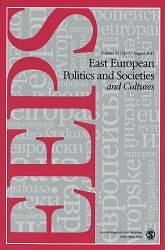(A)symmetry of (Non-)memory: The Missed Opportunity to Work Through the Traumatic Memory of the Polish–Ukrainian Ethnic Conflict in Pawłokoma
(A)symmetry of (Non-)memory: The Missed Opportunity to Work Through the Traumatic Memory of the Polish–Ukrainian Ethnic Conflict in Pawłokoma
Author(s): Mateusz MagierowskiSubject(s): Political history, International relations/trade, Victimology, WW II and following years (1940 - 1949), Inter-Ethnic Relations, Politics of History/Memory, Peace and Conflict Studies
Published by: SAGE Publications Ltd
Keywords: working through; collective memory; non-memory; memory frameworks; Polish–Ukrainian relations;
Summary/Abstract: During the Second World War, the village of Pawłokoma, nowadays located a dozen kilometres from the Polish–Ukrainian border, was an area of conflict between the two nations. It has been almost ten years since a ceremony was held commemorating the victims of the conflict. The ceremony was attended by the Polish and Ukrainian Presidents. Today, the village is a symbol of reconciliation between the two nations. This article analyzes the dynamics of local collective memory about the conflict, using the “working through” concept and works on social remembering as a theoretical framework. In my discussion of the causes and effects of the changes in dynamics, I use data from individual in-depth interviews with three categories of respondents: the inhabitants of Pawłokoma, local leaders, and experts. The aforementioned ceremony was an opportunity for working through the traumatic past in the local community of Pawłokoma. Although social consultations were held in Pawłokoma rather than a comprehensive working-through process, we should be talking about a symbolic substitute for this process. Despite the fact that material commemorations of the Polish and Ukrainian victims were erected, some factors essential to accomplishing the working-through process were missed, such as complex institutional support, the engagement of younger generations, and empathy towards the “Others” and their sufferings.
Journal: East European Politics and Societies
- Issue Year: 30/2016
- Issue No: 04
- Page Range: 766-784
- Page Count: 19
- Language: English
- Content File-PDF

